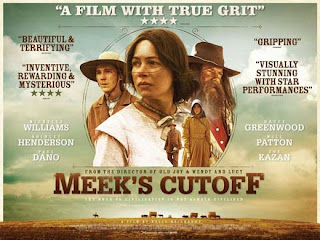 |
| Meek’s Cutoff (2010) |
Meek’s Cutoff is the kind of quiet movie that doesn’t get a lot of attention–or box office dollars–but should.
Set in 1845 on the Oregon Trail (insert obligatory joke about the Oregon Trail computer game), three families make their way west with the help of Stephen Meek (Bruce Greenwood), but soon realize that his ‘shortcut’ has left them lost and quickly running out of water. When they encounter and capture a Native American man, they ultimately decide that he must know the land better, and they choose him to lead them, despite political differences they perceive as “natural” and a language barrier. Whether he will lead them to water or to destruction is the question.
When I say quiet, I mean it. More than seven minutes pass before a word is uttered, during which time we see the families cross a deep river, one of the women holding a bright little caged canary aloft, and one of the men scratch the word LOST into a fallen tree. No words need to be spoken to read the situation these settlers find themselves in, and when words are finally spoken, they come from a child reading from the Bible.
The poster above connects
Meek’s Cutoff with another contemporary (although it is a remake) Western–
True Grit. While the films share female characters as the ones with the real grit, I’m actually reminded more of
There Will Be Blood, in terms of tone and subject (more on this later). I wrote about
Meek’s Cutoff when it was opening in theatres, and said the following about Westerns:
The Western genre is traditionally tied up in all kinds of rugged masculinity, and of all film genres, maybe best exemplifies the dominant way the United States collectively imagines itself: sturdy, adventurous, self sufficient, brave, and, well, pretty butch. The problem is, however, that this narrative leaves out a significant number of people, and a significant portion of the story. The Western (and the story of the U.S. West) tries to be the story of the United States itself, and reveals ideology so clearly where it fails–namely, in its depiction of women, indigenous peoples, immigrants, and African-Americans. The genre is, in other words, ripe for retellings and allegory.
Rugged masculinity is not lauded in Meek’s Cutoff, but depicted as dangerous and violent. Meek is not trustworthy, and is not even the central character in this Western. The quiet power here lies in the women, who are often depicted working–collecting firewood, washing, walking alongside the wagons–and discussing their situation, relying less than the men on divine providence and the violent tales of vicious Indians from a rebel cowboy. Emily (Michelle Williams) is the boldest of the women, though Millie and Glory (who is very pregnant) show strength and critical thought about their situation. While ideas about race and gender roles fit squarely in the 19th century (the women don’t even ask to vote when the men are choosing their path, and are quick and easy with racial epithets), the critique of the American mythos rings clearly.
In her review of
There Will Be Blood for this site, Lesley Jenike succinctly explains the dominance of white men in Serious, Important Films made in the U.S.:
If we consider some of our American cinematic “masterpieces,” we often find them absent vibrant female characters, for example (think The Godfather, Citizen Kane, and Chinatown to name just three). As much as I desperately want to see my gender portrayed with respect, honesty, and integrity, many films that deal with the great American mythos don’t have much room for female characters, simply because women haven’t been a part of, and are often still excluded from, the creation story we tell ourselves—a story of brutal boots-on-the-ground capitalism and, negatively speaking, punishing exploitation. It’s a Judeo-Christian story in which the individual male forges his path through the wilderness, an anti-hero who, despite his great wealth and power, can’t overcome his subsequent moral corruption. What’s important to recognize is that the marked absence of “the other” in these films is a comment on an institutionalized patriarchy that extends beyond our everyday interactions to the very heart of our cultural mythos. There Will Be Blood is yet another film that further cements a white male-dominated American story of origin.
Meek’s Cutoff, directed by Kelly Reichardt (Old Joy, Wendy & Lucy), explores the great American mythos without telling a story centered on a male protagonist. Families that went west were just that–families, consisting of men, women, and children. It’s possible to comment on institutionalized patriarchy and the American story of origin without entirely excluding women or revising history to make it less ugly, less cruel, or more inclusive. Women are part of the story, and maybe it takes more women to step up and tell the stories, lest we be excised completely.
There is much to say about this film, which is visually gorgeous and tense enough to keep you on the edge of your seat, but rather than go into intricate analyses of the imagery and possible political interpretations, I’m going to just recommend you rent (or buy) the film and do your own analysis.
Have you seen Meek’s Cutoff? If so, what did you think?

